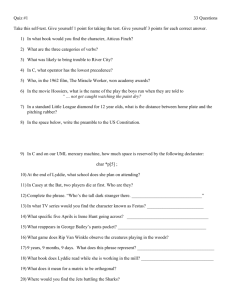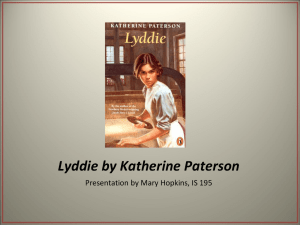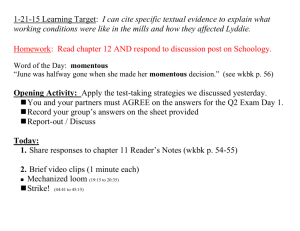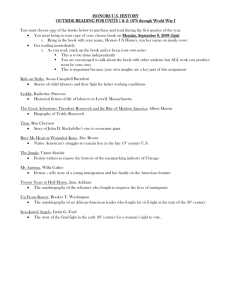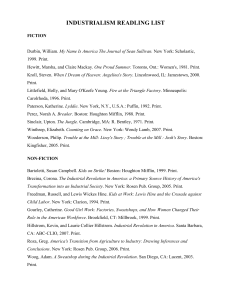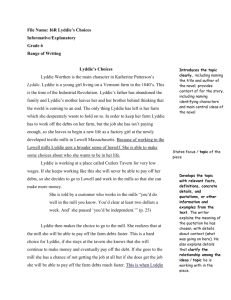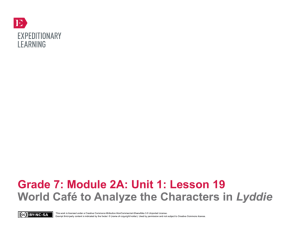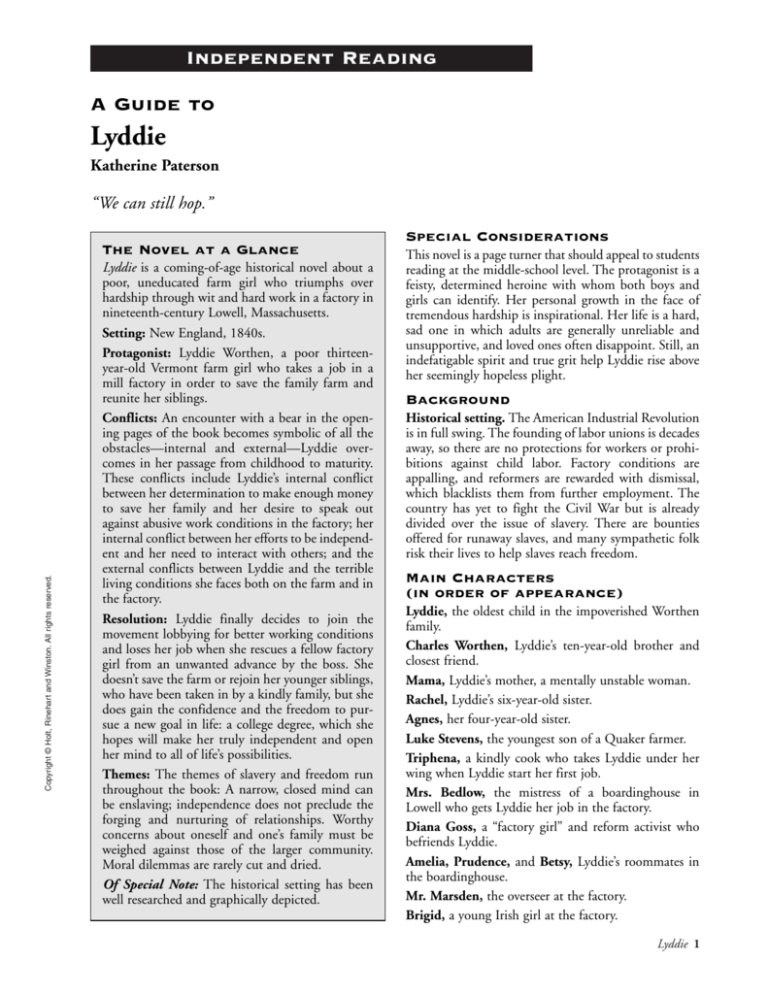
Independent Reading
A Guide to
Lyddie
Katherine Paterson
“We can still hop.”
Special Considerations
Copyright © Holt, Rinehart and Winston. All rights reserved.
The Novel at a Glance
Lyddie is a coming-of-age historical novel about a
poor, uneducated farm girl who triumphs over
hardship through wit and hard work in a factory in
nineteenth-century Lowell, Massachusetts.
Setting: New England, 1840s.
Protagonist: Lyddie Worthen, a poor thirteenyear-old Vermont farm girl who takes a job in a
mill factory in order to save the family farm and
reunite her siblings.
Conflicts: An encounter with a bear in the opening pages of the book becomes symbolic of all the
obstacles—internal and external—Lyddie overcomes in her passage from childhood to maturity.
These conflicts include Lyddie’s internal conflict
between her determination to make enough money
to save her family and her desire to speak out
against abusive work conditions in the factory; her
internal conflict between her efforts to be independent and her need to interact with others; and the
external conflicts between Lyddie and the terrible
living conditions she faces both on the farm and in
the factory.
Resolution: Lyddie finally decides to join the
movement lobbying for better working conditions
and loses her job when she rescues a fellow factory
girl from an unwanted advance by the boss. She
doesn’t save the farm or rejoin her younger siblings,
who have been taken in by a kindly family, but she
does gain the confidence and the freedom to pursue a new goal in life: a college degree, which she
hopes will make her truly independent and open
her mind to all of life’s possibilities.
Themes: The themes of slavery and freedom run
throughout the book: A narrow, closed mind can
be enslaving; independence does not preclude the
forging and nurturing of relationships. Worthy
concerns about oneself and one’s family must be
weighed against those of the larger community.
Moral dilemmas are rarely cut and dried.
Of Special Note: The historical setting has been
well researched and graphically depicted.
This novel is a page turner that should appeal to students
reading at the middle-school level. The protagonist is a
feisty, determined heroine with whom both boys and
girls can identify. Her personal growth in the face of
tremendous hardship is inspirational. Her life is a hard,
sad one in which adults are generally unreliable and
unsupportive, and loved ones often disappoint. Still, an
indefatigable spirit and true grit help Lyddie rise above
her seemingly hopeless plight.
Background
Historical setting. The American Industrial Revolution
is in full swing. The founding of labor unions is decades
away, so there are no protections for workers or prohibitions against child labor. Factory conditions are
appalling, and reformers are rewarded with dismissal,
which blacklists them from further employment. The
country has yet to fight the Civil War but is already
divided over the issue of slavery. There are bounties
offered for runaway slaves, and many sympathetic folk
risk their lives to help slaves reach freedom.
Main Characters
(in order of appearance)
Lyddie, the oldest child in the impoverished Worthen
family.
Charles Worthen, Lyddie’s ten-year-old brother and
closest friend.
Mama, Lyddie’s mother, a mentally unstable woman.
Rachel, Lyddie’s six-year-old sister.
Agnes, her four-year-old sister.
Luke Stevens, the youngest son of a Quaker farmer.
Triphena, a kindly cook who takes Lyddie under her
wing when Lyddie start her first job.
Mrs. Bedlow, the mistress of a boardinghouse in
Lowell who gets Lyddie her job in the factory.
Diana Goss, a “factory girl” and reform activist who
befriends Lyddie.
Amelia, Prudence, and Betsy, Lyddie’s roommates in
the boardinghouse.
Mr. Marsden, the overseer at the factory.
Brigid, a young Irish girl at the factory.
Lyddie 1
Chapter 1. We meet the main character, Lyddie, and
her family members when a big black bear stumbles
into their small farm cabin. The bear precipitates the
break-up of the family and becomes symbolic of the
obstacles Lyddie will meet on her life journey. Lyddie
takes control of the dangerous situation and ensures her
family’s safety by boldly staring the bear down. But
their unstable mother sees the bear as a sign of the end
of the world and decides to take her younger children
away to live with relatives. Lyddie stays behind to tend
the farm, and her brother Charles rejoins her once the
family has arrived safely at their destination. Lyddie and
Charles survive the winter and on the first warm day of
March, a young calf is born to their only cow. That
same day, a letter arrives from their mother informing
them that she has rented the farm and hired the two of
them out to pay debts. One line in the mother’s letter,
“We can still hop,” amuses the children and becomes an
ironic joke between them. The arrival of the letter is a
turning point in the plot.
Chapter 2. Lyddie and Charlie leave their cabin and
sell the calf to their kindly neighbor, Quaker Stevens.
His youngest son, Luke, drives Charles and Lyddie in
his horse and wagon to their new workplaces. Charles
is dropped off at Baker’s Mill and Lyddie is left at
Cutler’s Tavern where she is to work as a maid.
Chapter 3. Lyddie arrives at the tavern, realizing that
once she walks through the gate she will lose her freedom.
Just then, in a foreshadowing of her own future, Lyddie
encounters a kindly, elegant lady as the woman disembarks from a stagecoach outside the tavern. (Months
later, she learns that the lady is a “factory girl” who
earns good money at a mill in Lowell, Massachusetts.)
Outside the tavern, the dirty and barefoot Lyddie is
mistaken for a beggar by Mistress Cutler. Under the
watchful eye of the mistress, a beleaguered Lyddie
works even harder than she did on the farm. The only
comfort she has comes late at night when she counts
the money she has saved from the sale of the calf.
Chapter 4. Lyddie is befriended by Triphena, the tavern cook, who tells her an allegory about two frogs
who fell into a pail of milk. One drowned immediately,
but the other kicked so hard it made a pat of butter on
which it was found perched in the morning. “Some
folks are natural born kickers,” says Triphena, obviously
referring to Lyddie. Lyddie misses Charlie, who pays
her a short visit, but memories of her mother, father,
and sisters gradually fade. Lyddie hears talk of the generous bounty paid for runaway slaves.
Chapter 5. When Mistress Cutler goes to Boston to sell
her maple sugar, Triphena urges Lyddie to pay a visit
home. Lyddie stops at the mill to see Charlie but learns
he is at school. She resents the new family that has
taken her brother in. She travels on to the farm. When
she gets in through the window, she sees a shadowy
2 Lyddie
form at the fireplace. She is face to face with the first
black man she has ever seen.
Chapter 6. Lyddie’s encounter with Ezekial Abernathy,
a runaway slave, is a turning point in her development.
She sees the parallels between her own quest for freedom and Ezekial’s. As she is leaving, she impulsively
gives him the calf money she has saved so carefully.
When she returns to the tavern, she is fired from her
job—another turning point. Lyddie decides to set off
for Lowell, Massachusetts, to become a factory girl.
Chapter 7. Triphena gives Lyddie money to make the
long journey to Lowell by carriage. When the coach
gets stuck, the girl takes control of the situation and
helps the hapless male passengers right the carriage. The
grateful coachman is impressed with Lyddie and brings
her to his sister’s boardinghouse in Lowell.
Chapter 8. The coachman’s sister Mrs. Bedlow
befriends Lyddie, giving her money to buy new clothes
and arranging for her employment at a factory run by
the Concord Corporation. Lyddie meets her roommates in the boarding house, Amelia, Prudence, and
Betsy, who also work at the factory.
Chapter 9. Lyddie starts work in the noisy, dusty weaving room. Mr. Marsden, the overseer, assigns her to
kindly Diana Goss, an experienced factory girl, who
takes Lyddie under her wing and teaches her how to
read. Though her roommates warn her that Diana is a
radical agitator for better working conditions, Lyddie
sees only her kindness. Diana encourages Lyddie to
write to her mother and brother of her new employment
and posts the letters for her. In the reaction of Lyddie’s
roommates to Diana, we see a foreshadowing of the
conflict Lyddie faces throughout much of the book.
Chapter 10. Lyddie has trouble adjusting to her new
life and the terrible conditions in which she works. One
night her roommate Betsy asks if she can read to the
exhausted Lyddie. Lyddie agrees and fights off sleep as
she devours every word of Charles Dickens’s Oliver Twist.
Chapter 11. Lyddie’s spirit is lifted by Betsy’s reading,
and Betsy confides that she is working to put herself
through Oberlin College. Lyddie declines Diana’s invitation to a mass meeting of the ten-hour movement to
limit the length of the workday. During the summer
break when the other girls go home, Lyddie works even
harder for extra money. She borrows Oliver Twist from
the library and soon after decides to buy her very own
copy of the book.
Chapter 12. Lyddie pastes pages of Oliver Twist before
her as she works and sees parallels with her own life. She
receives a letter from her mother asking for more
money and informing her of her little sister Agnes’s
death. Lyddie works harder than ever for her family, the
lone girl not to complain when the machines are
speeded up to increase productivity. Prudence, wracked
by a nagging cough, is the first of the roommates to
quit the factory, leaving Betsy and Lyddie, the two
Copyright © Holt, Rinehart and Winston. All rights reserved.
Plot
Copyright © Holt, Rinehart and Winston. All rights reserved.
bookworms, with Amelia, the pious Christian.
Conflict among the three is highlighted as the girls discuss signing the petition for better working conditions.
Betsy insists that they are all slaves and threatens to sign
the petition. Lyddie is in favor of the status quo—desperately wanting to make as much money as she can
despite the wretched conditions in which she works.
Chapter 13. Lyddie tries to convince herself that she is
not a slave and begins to avoid Diana and Betsy. Lyddie
now is so efficient that she operates four looms on her
own. She writes to both her mother and brother telling
them of her efforts to pay off the family debt. Betsy
announces that she will sign the petition and then
apply to Oberlin College when she is fired for it, a decision that foreshadows Lyddie’s future. Lyddie is so
single-minded that she pays no attention to the needs
or cares of others. But when she is hurt on the job, the
generous and considerate Diana tends to her injury and
arranges for a doctor friend to look at Lyddie’s
wound—free of charge.
Chapter 14. Amelia is the next girl to leave, tired by the
speeded-up pace. Lyddie, now considered Marsden’s best
girl, is given a new operator called Brigid to train. Lyddie
resents the time away from her own machines. She is
impatient with the new girl, an Irish immigrant, and dismisses all the Irish as fools. Diana gently corrects her and
chides her about signing the petition. Betsy, who has
come down with a cough, signs the petition, which angers
Lyddie. But Betsy is not fired or blacklisted; she’s forced
to leave because of her poor health. Luke Stevens comes
to visit Lyddie and delivers a letter from the runaway slave
Ezekial, who has escaped to safety and now repays his
debt to Lyddie with interest. Lyddie writes to her mother
asking to know the sum of their debt. Reluctantly, she
encloses a dollar bill. We see character development as
Lyddie wakes up troubled by the fact that although she
once gave her entire fortune to a stranger, she now
begrudges sending her own mother a dollar.
Chapter 15. Just as Lyddie is convinced she has nearly
paid off her debt, her uncle arrives at the boardinghouse
with her sister Rachel in tow. He tells her that their
mother is now in an asylum and that the farm is going
to be sold. Lyddie convinces the kindly Mrs. Bedlow to
let Rachel stay with her. She writes to Charles begging
him to stop the sale of the farm. At work, when the
overseer Marsden threatens to fire Brigid, Lyddie offers
to help the struggling girl. Lyddie finds her only comfort
in the familiar words of Oliver Twist.
Chapter 16. Lyddie spends more than two weeks’
wages buying new clothes and books for Rachel; Lyddie
and Rachel are happy together. Work improves as well
after Lyddie gives Brigid money to pay a doctor’s bill.
One evening, Mr. Marsden keeps Lyddie after work
and puts his arms around her. Feverish, Lyddie kicks
him and escapes from his clutches. Lyddie’s fever rages
for many days, during which Mrs. Bedlow, Diana,
Brigid, and Rachel all tend to her.
Chapter 17. Lyddie finally recovers her strength and
returns to the mill with considerable trepidation at the
prospect of seeing Marsden again. But nothing happens when the two meet. Mrs. Bedlow gets little Rachel
a job at the mill as a doffer. Rachel softens Lyddie,
whom the other girls regard as mean and distant.
Lyddie worries when the child’s coughing awakens her
from her night’s sleep. She knows her heart will break
if she loses Rachel.
Chapter 18. Charlie never answers Lyddie’s letter.
Instead, the thirteen-year-old comes to visit her in person. The meeting is awkward. Charlie tells her that the
Phinneys treat him like their own son and want to care
for little Rachel as well. A desolate Lyddie agrees to let
Rachel go. Charlie also tells her that the farm will be
sold and that the profits will go to their uncle. Finally,
he gives Lyddie a letter from Luke Stevens. The son of
the kindly Quaker tells Lyddie that his father has
bought the farm, and proposes marriage. Lyddie is
insulted by the suggestion that she can be bought.
Once again she sees the parallels between slavery and
her situation. She tears the letter into bits and, uncharacteristically, bursts into tears. The visit by Charlie is a
turning point in the story: Lyddie no longer has to
weigh concerns for her family against concerns about
factory conditions and her own life.
Chapter 19. Lyddie feels the loneliness in her heart like
a physical pain. Work drags on and she realizes that she
no longer has a purpose in life. Having lost her family,
Lyddie has only her work. Diana seems preoccupied
and looks sickly. Lyddie goes to a meeting where she
declares that she is finally ready to sign the petition,
only to be told that she is too late. Lyddie feels that she
has been too late in all her endeavors—from keeping
her family together to joining the movement. On the
way home Diana confides that she is leaving the factory
because she is pregnant. She is determined to leave
before her condition brings shame on the association.
Chapter 20. Lyddie treats herself to more books and slips
into the role that Diana once played in the factory. She
coaches the new girls and helps Brigid learn how to read.
She receives a letter from Charlie telling her that all is well
and reminding her to reply to Luke’s letter. A letter from
the asylum informs Lyddie of her mother’s death. Now,
the person closest to her is Brigid. Lyddie saves Brigid
from Mr. Marsden’s unwelcome pawing advances by
dumping a bucket full of water over his head.
Chapter 21. In the big climax of the book, Lyddie is
summoned to the agent’s office at the mill because
Marsden has reported her as a troublemaker on the
floor. Lyddie denies the charge and asks that Marsden
be called to confront her with his complaints. When
Marsden repeats the charges, Lyddie leaps to her feet in
her own defense. But she is silenced by her own ignorance when told the problem is one of “moral turpitude.” Not understanding the meaning of the word
turpitude, she falls silent. Lyddie is dismissed without a
Lyddie 3
Chapter 22. Lyddie feels that the bear—the symbol of
all the obstacles in her life—has won. She withdraws
her $243.87 savings from the bank. Then she buys
another copy of Oliver Twist for Rachel and a dictionary for herself. When she learns the meaning of moral
turpitude, she is outraged and runs to Brigid’s home.
She tells Brigid of her own dismissal and of a letter she
has written to Marsden warning him of the consequences should he decide to dismiss Brigid as well. That
evening, she waits for Marsden to leave work and steps
out of the shadows to confront him. The next day,
Lyddie takes a stage to Boston and looks up her old
friend Diana, hoping to be of some help to her. But
Diana is happily settled with a widowed shopkeeper
and her daughter as she awaits the birth of her child.
Lyddie is happy at Diana’s happiness but cries in despair
most of the way home to Vermont.
Chapter 23. Lyddie makes her way back to Cutler’s
Tavern and falls into Triphena’s arms. Lyddie tells
Triphena of her losses and of her newfound freedom.
She asks for her old job back, but it has been filled.
Lyddie makes her way to the Phinney residence the next
day to see her two remaining siblings. Charlie and
Rachel are at school, so Lyddie keeps on walking all the
way up to the old farm. Lyddie enters, lights a fire, and
pulls her mother’s rocker up to the hearth. She feels
nearly content. Her reverie is interrupted by Luke
Stevens. Luke apologizes for his letter and asks Lyddie of
her plans. In the resolution of the novel, Lyddie knows
without even thinking. She will stare down the bear
that she thought was outside herself but was in her own
narrow spirit. She announces that she will go to college.
Luke is admiring of her spirit, and Lyddie looks up into
the face of the man whom she will someday marry.
Approaches for
Post-Reading Activities
The outstanding element of this novel is its historical
setting. This focus makes the novel an excellent
adjunct to social studies courses focusing on U.S. history. Discussion groups or students doing individual
research projects might focus on the following activities.
1. Investigating the Historical Background
One of the first things young readers might want to
talk about in regard to this novel is “Did things like
this really happen?” That question could lead to an
Copyright © by Holt, Rinehart and Winston, Inc.
All rights reserved. No part of this publication may be reproduced
or transmitted in any form or by any means, electronic
or mechanical, including photocopy, recording, or any information
storage and retrieval system.
Printed in the United States of America
4 Lyddie
investigation of several features of the novel’s historical setting:
• Working conditions in New England textile mills
• Educational opportunities available to women in
the 1840s
• Employment opportunities for women in the 1840s
• The impact of women’s activism on the abolition
of slavery
2. Extending the Novel
Proficient readers might want to compare Lyddie to
the novel that has such a profound effect on Lyddie:
Charles Dickens’s Oliver Twist.
• How are the main characters similar?
• To what extent are they different?
• What about the settings? How does Victorian
England compare to industrial New England?
• In what ways did events in Oliver Twist influence
Lyddie?
Meet the Writer
Katherine Paterson is a much acclaimed author
whose books have been published in eighteen languages. Among her many literary honors are two
Newbery Medals and two National Book Awards. She
and her husband have four children and live in Barre,
Vermont. Lyddie came out of her participation in the
Women’s History Project celebrating Vermont’s bicentennial in 1991.
Read On
Katherine Paterson, Bridge to Terabithia. A classic
novel of friendship set in rural Virginia.
Bernice Selden, The Mill Girls: Lucy Larcom,
Harriet Hanson Robinson, Sarah G. Bagley. An
account of three farm girls who work in the New
England textile industry during the 1830s.
Blanche Hannalis, The Secret Garden. This play,
based on the famous novel by Frances Hodgson
Burnett, shows how a bitter orphan comes to realize the
importance of friendship and nurturing relationships.
Mildred D. Taylor, “Song of the Trees.” The young
heroine of this story fights overwhelming forces to save
the trees that grow on her family’s land.
Dorothy M. Johnson, “Too Soon a Woman.” A short
story about a courageous young woman who risks her
life to save a family that has befriended her.
Copyright © Holt, Rinehart and Winston. All rights reserved.
certificate of honorable discharge, making employment
at other mills impossible.

